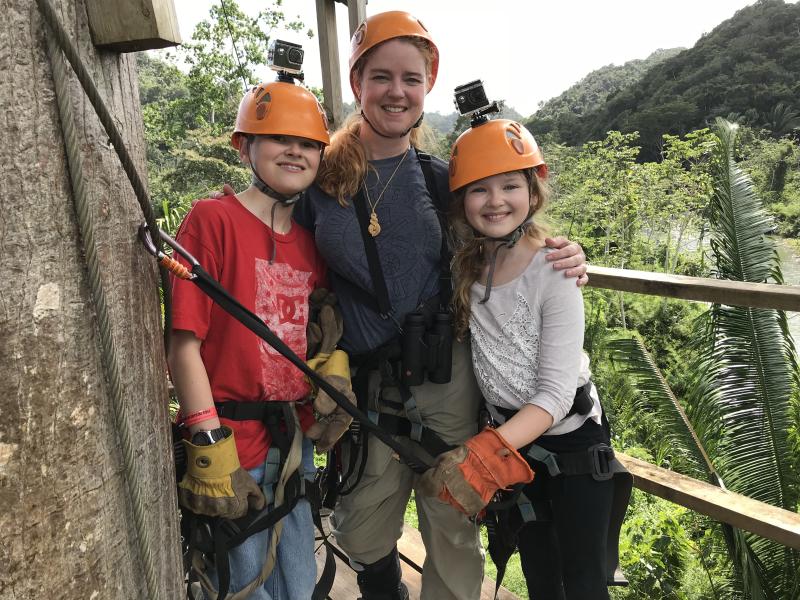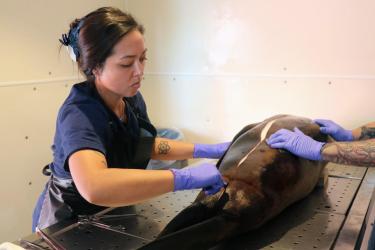Where did you grow up?
I grew up in Santa Fe, New Mexico.
What is your educational background?
I graduated from the University of New Mexico in B.S. Biology cum laude with an emphasis on animal behavior. I also completed my M.S. in Molecular Biology at Texas Tech University working on emu DNA and researching the genome sizes of flightless birds.
Are you a member of a community organization, church, or volunteer/mentorship program?
I’m a member of The Nature Conservancy, The Society for Freshwater Science, The Society for Conservation Biology, and The Wildlife Society - Western Section.
Is there a book, quote, or person that influenced you to be the person that you are today?
Two quotes that resonate with me are:“When we try to pick out anything by itself, we find it hitched to everything else in the Universe.”—John Muir
“Wildness reminds us what it means to be human, what we are connected to rather than what we are separate from.”—Terry Tempest Williams
What does being a career civil servant mean to you?
For me, it’s being dedicated to upholding our laws and mission. For NOAA Fisheries, that means making science-based decisions to protect animas under the Endangered Species Act, working to achieve our recovery plan goals, and leveraging our partnerships to achieve those. That entails sometimes challenging conversations, but it’s our duty to do everything that we are empowered to do so these species do not go extinct on our watch.
What advice would you have for today’s youth interested in a federal government career?
The federal government is a great place to work for many reasons—alignment with your career goals (there are lots of options), benefits, and more. During my tenure, I’ve appreciated that there is a real sense of being part of the “federal family,” which includes a unity of purpose and working together. I highly recommend looking into career options and seeking out a mentor who may already work here to help you figure it out. Applying through USAJobs may seem complicated, but there are some simple tips to make your applications more successful. There are a number of options for entry into federal service, including the Pathways internship program, the Hollings Prep Scholarship Program, STEP or SCEP options. There is more than one way to get on board! I didn’t consider working for the federal government for a very long time, which was mostly based on a lack of understanding how many options there are; I wish I had explored it sooner.
Can you describe a typical day at work?
Most of my time with NOAA Fisheries has been during the pandemic. I was brought on as a branch supervisor to a great team that implements Endangered Species Act protections for the listed species within our geographic area, the Sacramento River watershed in northern California. A typical day usually consists of many online meetings and calls that include lots of coordination with our partner agencies (such as the U.S. Army Corps of Engineers, Caltrans, the California Department of Wildlife, Department of Water Resources, hydropower generation facilities managers, etc.), hatcheries management issues, etc. I am often reviewing letters or biological opinions that are issued under section 7 of the ESA, doing interagency coordination on projects that affect multiple agencies, and cross-program coordination with our other offices or our Science Centers. California has the most managed water system in the country (lots of dams, weirs, canals, etc.). We try to find creative ways to ensure our migratory fish are able to access the habitat they need to thrive. There are also occasional enforcement actions that we participate in.
What are you working on now?
My work is largely focused on supporting my staff. I am also currently organizing a multi-agency and non-governmental organization floodplain symposium for this fall. We hope it will further the conversation of how best to expand floodplain habitat to listed fish on a regional level, which, if implemented well, we know can benefit the species.
Can you describe a project you worked on that was particularly interesting or enjoyable?
When I worked at the U.S. Fish and Wildlife Service, I was in the Habitat Conservation Planning division. I worked for 7 years on a large-scale, county HCP working toward covering their 50-year buildout plans for take of ESA-listed species. When I came to work for NOAA Fisheries, that same Habitat Conservation Planning was coming through the process for a section 10 permit, so I was able to understand and appreciate the enormous amount of work that went into planning and conservation efforts, the benefits to the listed species, and advocate for the best possible outcome. That project applicant just received their permit a couple of months ago and it’s very gratifying to know that all those years of hard work will reap benefits for the species.
What are some of your hobbies?
Spending time with my kids, birdwatching, hiking, camping, nature photography, travel, listening to and performing music, and genealogy (I just finished writing a book on some family history).








